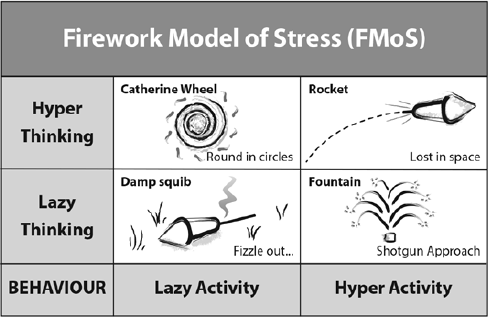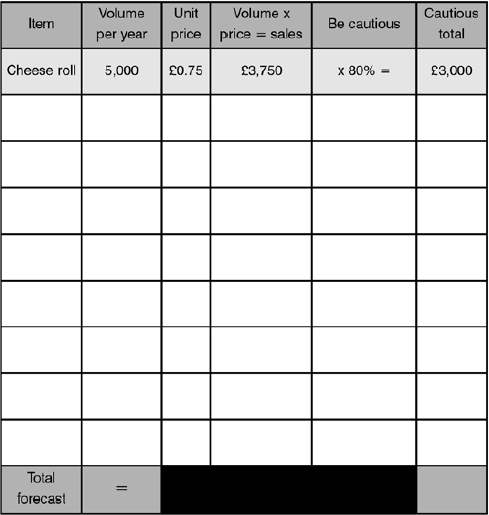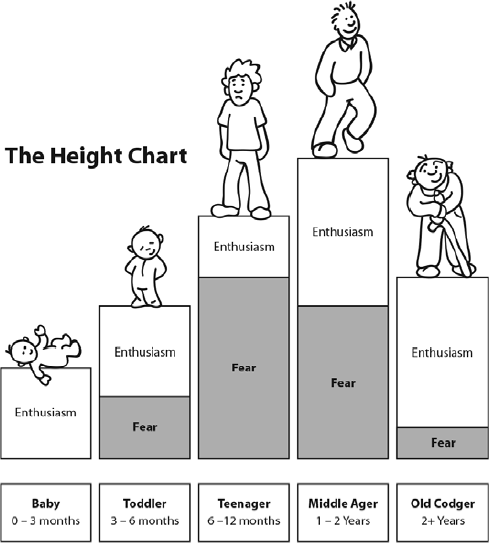To download a copy of your Personal Planning Kit, please visit www.richardmaun.com
SECTION 1: A SENSE OF THE FUTURE (PAGE 15)
Part A: Relax and let your thoughts and feelings swill about. What is your sense of what you would like to do? No need to be precise, if you’re not too sure. Write down the sort of thing that you fancy having a go at:

Part B: Now imagine you are doing some of the stuff from Part A. For fun, have a go at describing what your working week, or an average day, looks like. Write it, draw it or just jot down some points to capture the feeling of actually being there:

Part C: What new skills or experience do you need to acquire to help turn your dream into a reality? How will you get what you need?

Part D: What resources will your business need to get started? Think about equipment, people, premises, stock, insurance, training and any critical ‘must have’ items:

Part E: What type of business will you be? Tick an option:
 Sole trader
Sole trader
 Limited company
Limited company
 Partnership
Partnership
SECTION 2: ASSUMPTIONS AND BANK OF FAMILY (PAGE 25)
Part A: Assumptions. List the ones you are making about the size and shape of your business – and remember to look around you at current competitors. If your local florist drives an old van, then wonder why. Or if your chum who is a consultant spends all her time away from home, ask her how much she spends on food and hotels ...

Part B: Bank of Family. How much emotional credit do you have lodged with them, that you can draw on to support you through the tough times ahead? On a scale of 1 to 50 ask your family to put a cross on the line to show you where they are:

SECTION 3: THE FIREWORKS CODE (PAGE 45)
Copy your scores onto the scales and then circle the firework that best represents the behaviour others are likely to see from you:
| |
A Thinking |
|
Quick, or shallow thinking |
– 1 2 3 4 5 6 7 8 9 10 – |
Deep thinking, or fixated thinking |
| |
B Activity |
|
Inactivity, or sluggish movement |
– 1 2 3 4 5 6 7 8 9 10 – |
Train-track direction, or shotgun approach |

SECTION 4: YOUR SUPPORTERS CLUB (PAGE 51) Note down the contact details and the reason why each person is on your list. If you’re stuck for a great reason, then choose again:


SECTION 5: TEAM QUESTIONS (PAGE 52)
Add five more questions to the list that you would like to ask your supporters club. Any question that has value to you is a good question! Useful questions:
1 What questions do I need to ask you?
2 If you were starting today, what would you do differently?
3 How do you find new customers?
4 When did you get it wrong and what did you learn?
5 Who do you know who would be useful for me to talk to?

SECTION 6: I AM SPECIAL BECAUSE ... (PAGE 54)
Write down the strengths, skills and useful experiences you have which you would share with clients, in order for them to be reassured that you are worth spending money with:
1 My strengths include:

2 My skills include:

3 My relevant experience includes:

SECTION 7: CREATING AN OPENING (PAGE 70)
Ask questions to get the client talking and to generate an opening, which you can fill with your product and/or service. Note three examples, one closed and two open:
Closed question:

Open question:

Open question:

SECTION 8: SELLING BY NUMBERS (PAGE 77)
List the products you will sell, the volume of your sales in the first year and the price you will sell them for. Then add up your guesses, trim them back to 80 per cent and discover whether this income will pay all the bills. An example is included – and remember to leave it out of your totals!

SECTION 9: THE NAME GAME (PAGE 87)
My three possible business names are:

Tick when you have checked them at Companies House, the Patent Office and made sure the website address is available for your favourite: 
SECTION 10: DIFFERENTIATE OR DIE (PAGE 91) Part A: Write down the negative messages you have in your head, then cross them out! They no longer have value to you:

Part B: Write down what you know about your closest competitor. What products/services does he/she/it offer? Why do people buy from them?

Part C: Yourself. What do you well?

Part D: Your business. Think about what you will do. How will you do it differently from your competitor? Remember to include small details, as all differences have value.

SECTION 11: MARKETING TOOLBOX (PAGE 94) Which marketing tools will you need to let people know you exist? Tick the ones you will organize, but think about the costs involved as well, as you may not need or be able to afford all of them.
 Business card
Business card
 Pre-printed letterhead
Pre-printed letterhead
 Compliments slip
Compliments slip
 One-page leaflet
One-page leaflet
 Multi-page brochure
Multi-page brochure
 Press release
Press release
 Magazine advert
Magazine advert
 Special packaging
Special packaging
SECTION 12: NET-WORK (PAGE 106)
What specific business opportunity will you be asking the people in your network to look out for? Write it here in one short sentence.
 I am looking for:
I am looking for:

Secondly, think about people you already know to whom you could mention this opportunity. Add as many names as you can to each of the categories below:
 Friends
Friends
 Family
Family
 Leisure clubs
Leisure clubs
 Ex-colleagues
Ex-colleagues
 Suppliers
Suppliers
 Competitors
Competitors
 Local businesses
Local businesses
 Who else?
Who else?
SECTION 13: YOUR SKINNY MINUTE (PAGE 113) Write down eight key points that describe your business. Paula’s Pets is used as an example on the right-hand side.
Your business |
Paula’s Pets |
1. |
1. Exotic |
2. |
2. Reptiles |
3. |
3. Five years |
4. |
4. Homes and schools |
5. |
5. Seven poisonous snakes |
6. |
6. Insurance |
7. |
7. Pole dancing |
8. |
8. Chameleons |
SECTION 14: TRAWLING (PAGE 127)
Clear contracting for success is about the administrative details, the goals and processes and the fishy bits. Write down three questions Peter could have asked at his interview to find some of the fish which were clearly lurking in the depths:

SECTION 15: THE HEIGHT CHART (PAGE 145)
Tick the box that best describes your mood today, then cement this by colouring in the cartoon on top of the bar of your current stage.
 Baby – just born into an exciting world
Baby – just born into an exciting world
 Toddler – one or two skills, lots of enthusiasm
Toddler – one or two skills, lots of enthusiasm
 Teenager – fed up and worried at your lack of instant success
Teenager – fed up and worried at your lack of instant success
 Middle Ager – worldly and experienced, some success balanced by continued effort
Middle Ager – worldly and experienced, some success balanced by continued effort
 Old Codger – sustainable and complacent, watch out for the younger hungry types
Old Codger – sustainable and complacent, watch out for the younger hungry types

SECTION 16: LUCKY NUMBERS (PAGE 162)
Produce a profit and loss spreadsheet for your first three years of trading. Use the example in the chapter as a guide if it helps. Then when you have a useful document, tick the box!
 I have a P&L spreadsheet that I am happy with
I have a P&L spreadsheet that I am happy with 
SECTION 17: CASH OR CRASH (PAGE 168)
If you do nothing else by way of business planning, at least draw up a cashflow forecast. Check your assumptions and build in some contingency, because it will rain at some point! Then tick the boxes:
 I have a cashflow forecast covering the first six months.
I have a cashflow forecast covering the first six months.
 I have a cashflow forecast covering the first two years, taking me into a successful position.
I have a cashflow forecast covering the first two years, taking me into a successful position.
 CELEBRATION TIME
CELEBRATION TIME
Well done me, for making it this far. I have completed a useful planning exercise and feel very proud of myself. Full of confidence, I can tick ‘yes’ to the following essential skills and resources:
 I have talent.
I have talent.
 I will be successful.
I will be successful.
 I understand the difference between profit and cash.
I understand the difference between profit and cash.
 I know what sort of firework best describes me.
I know what sort of firework best describes me.
 I have a sexy skinny minute in my pocket.
I have a sexy skinny minute in my pocket.
 I am ready to work my network.
I am ready to work my network.
 I am a special loveable person who can follow their own path in life.
I am a special loveable person who can follow their own path in life.
 I have my own chair and I’m keeping it to myself!
I have my own chair and I’m keeping it to myself!
Hooray!
The bastards are now way behind me and the future looks fantastic.






 Sole trader
Sole trader

















 I am looking for:
I am looking for:

